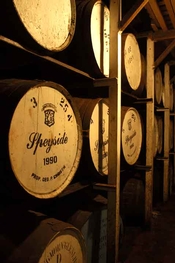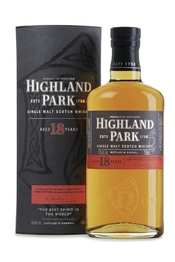Traditionally, single malt Scotch whisky is aged in once-used American oak barrels, often previously used to mature American Bourbon whiskey. By law, Bourbon must be aged a minimum of two years in new oak barrels, allowing for an abundant supply of used barrels that ultimately see new service in the malt distilleries of Scotland.
Long ago, single malt distillers looked for a way to “mellow” their new whiskies that they were not getting from American oak, so by the beginning of the 20th century, the practical move was to ex-Sherry casks, since at that time Sherry was shipped to the United Kingdom in oak casks. David Daiches, in his informative book, Scotch Whisky, says that William Sanderson, the man who developed Vat 69 (blended) whisky, first wrote about the use of Sherry casks for aging malt Scotch whisky in 1864. The theory at the time was that residual Sherry left in the casks migrated into the whisky, mellowing the new spirit and also changing its color; Fino Sherry a lighter color; Oloroso a darker color. More current thinking is that the influence of secondary wood (Sherry, Port, Madeira, Red Wine) is not as important as the barrel itself.
whiskies that they were not getting from American oak, so by the beginning of the 20th century, the practical move was to ex-Sherry casks, since at that time Sherry was shipped to the United Kingdom in oak casks. David Daiches, in his informative book, Scotch Whisky, says that William Sanderson, the man who developed Vat 69 (blended) whisky, first wrote about the use of Sherry casks for aging malt Scotch whisky in 1864. The theory at the time was that residual Sherry left in the casks migrated into the whisky, mellowing the new spirit and also changing its color; Fino Sherry a lighter color; Oloroso a darker color. More current thinking is that the influence of secondary wood (Sherry, Port, Madeira, Red Wine) is not as important as the barrel itself.
The Macallan, the Highland-Speyside distillery that has long maintained its position at the head of a long line of excellent single malts, built its reputation on Speyside Malt Whisky aged in ex-sherry casks, built from both Spanish and American oak. Going beyond double-wood, The Mcallan has a “Five Oak” Triple Cask Matured — European Oak/Sherry, American Oak/Sherry and American Oak/Bourbon malt whisky. And there are many other Highland Malt distillers with a reputation for using sherry wood to age their malts, including Glenmorangie, Northern Highlands, Glenfarclas, Speyside and The Balvenie, Speyside.
The use of ex-sherry casks is not limited to Highland distillers.  Talisker, from the isle of Skye, bottles a Distiller’s Edition Amoroso Double Matured. The Arran Malt, from the Isle of Arran, has a Single Cask Sherry #69, and Bruichladdich, from Islay, sells PC7 (Port Charlotte), aged in sherry and bourbon oak. My favorite single malt, Highland Park 18 Years, is sherry wood aged.
Talisker, from the isle of Skye, bottles a Distiller’s Edition Amoroso Double Matured. The Arran Malt, from the Isle of Arran, has a Single Cask Sherry #69, and Bruichladdich, from Islay, sells PC7 (Port Charlotte), aged in sherry and bourbon oak. My favorite single malt, Highland Park 18 Years, is sherry wood aged.
Since the advent of the use of sherry oak, malt whisky distillers have experimented with a wide range of what is known as “ACD” or Additional Cask Enhancement. Here’s a small sampling, by region, from the many interesting ACD Single Malts available today. Highland ACD Single Malts: Ballechin, from Edradour #2 Heavily Peated and #3 Port Cask; The Balvenie 12 Years, Double Wood Boubon and Sherry; Murray McDavid Glendullan Speyside Bourbon and Tempranillo; Benromach Speyside, Marsala Casks; Glenfarclas 27 Years Port Cask; BenRaich 16 Years, Sauternes Wood Finish; BenRaich 13 Years Maderensis Fumosis (Madeira Wood Finish), and Glenmorangie Port Wood, Sherry Wood and Madeira Wood.
Island ACD Single Malts: The Arran Malt, Chianti Wine Cask; Bruichladdich “Flirtation” 20 Years, Mourvedre Casks from the South of France; Bruichladdich “Infinity,” Rioja Casks; The Arran Malt Cask Single Bourbon Cask #1801; Lagavulin (Islay) Distiller’s Edition PX (Pedro Ximenez) Finish.
All of this ACD activity, of course, raises the question about whether these double and triple wood malts are “truly” malt whisky. A similar question applies to some wines, such as when Spain’s Miquel Torres decided to add Chardonnay and other non-Spanish grapes to his wines. Were the “new” wines still representative of the Penedes sub-region of Cataluna? Torres, of course, continues to make wines from traditional grapes, just as malt distillers have not given over completely to ACD malt whiskies, so maybe the question is a non-starter, but then….
Like wine, single malt whiskies are available in a huge range of styles and prices. The best policy is to find a retailer that specializes in malt whisky to do your shopping. Single Malts range in price from about $35 to $1,900 for The Mcallan 1824 Limited Release, but the average is about $40 to $45. A final word: Throughout this two-part piece on Single Malt Scotch Whisky, I’ve used two spellings for whisky and whiskey. Basically the accepted convention is Scotland and Canada use “whisky,” while the United States and Ireland prefer “whiskey.” Slainte!
6
